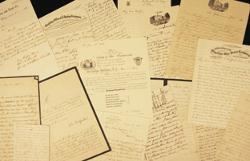Shortly after John Bigelow edited and published the lost
manuscript of Benjamin Franklin’s groundbreaking autobiography in 1868, he shipped several copies to Charles Dickens, an old friend.
The men, who met years earlier in London, had recently socialized during one of Dickens’s reading tours in the United States.
The tour had taken a toll on Dickens’s health.
“My foot is so painful and so incommodes me in the action of sitting up, that I can hardly thank you (through the agency of pen, ink, and paper) for your book,” Dickens lamented in a letter to Bigelow in April 1868.
A copy of the Dickens letter is among more than 20,000 in the John Bigelow Correspondence File that fills nine cabinets in Schaffer Library’s Special Collections. For the first time, the letters to and from such heavyweights as Theodore Roosevelt, Andrew Carnegie and Mark Twain are now searchable through a digital index.
That should thrill scholars, historians and fans of Bigelow, Class of 1835 and one of the most distinguished figures of the 19th and early 20th century. Managing editor and co-owner of the New York Evening Post until 1861, Bigelow also served as consul-general and later as minister to France under President Abraham Lincoln.
“This is a potentially rich source of material for all disciplines,” said Annette LeClair, head of technical services at Schaffer.
LeClair and a team that included library staff members and students spent nearly two years painstakingly transferring notes from thousands of index cards which have served as guideposts to the letters and documents since they were gifted to the College 50 years ago on behalf of the Bigelow family.
The database was designed by David Fuller, Systems Librarian, and other material for the project website was put together by the library’s Digital Services staff including Librarian Gail Golderman, Specialist Jennifer Carr and Assistant Matthew Connolly.
Creating the index wasn’t an easy task. Many of the letters contained only a first or last name, or simply an initial. Some lacked dates. Staff who compiled the original typed index cards were forced to make educated guesses about pertinent information related to the letters. The digital index tries to stay true to that guesswork.
“We wanted to respect the work that had been done in the past,” LeClair said.
The index is part of an ongoing project to draw attention to Bigelow on the centennial of his death on Dec. 19, 1911, at the age of 94. Called Remembered First Citizen in a nod to Margaret Clapp’s 1947 Pulitzer Prize-winning biography of Bigelow, Forgotten First Citizen, the project also included an exhibit in Schaffer Library.
